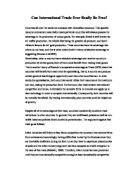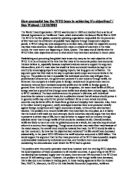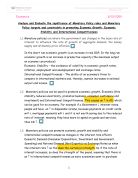‘To What Extent Can the Period 1945-70 Be Termed the Pax Americana With Regard To the Management of the the international economy?
LONDON GUILDHALL UNIVERSITY DEPARTMENT OF ECONOMICS ES325 INTERNATIONAL ECONOMIC HISTORY SINCE 1870 Essay title, 'To what extent can the period 1945-70 be termed the Pax Americana with regard to the management of the international economy' By: Abzar Choudhury Author: Abzar Choudhury Student ID: 97/281-766 Date: 26/04/00 Word count: 2,279 Pax Americana The Roman Empire evolved from centuries of hard labour and intellectual economic co-ordination such as their road networks of which the remains that has still survived in Europe and Asia to this present day is no comparison to the development of the Bretton Woods agreement of 1944. Although, the old Bretton Woods agreement had a short life, which lasted from 1944 to 1971, the period of 1945 to 1970 can certainly be termed the 'Pax American' with regard to the management of the international economy. The period as mentioned above with regard to the Bretton Woods agreement is termed 'Pax American' because America was the main driving force behind the management of the international economy. Now, the questions we should be asking are how was America able to lead the international economy and was it successful? Following the experience of disharmony during the 1930s let to the establishment of the Bretton Woods system after a NU's Conference that took place during July of 1944 at Bretton Woods, New Hampshire,
If you want to feed the people of the third world eat chocolate - Discuss.
If you want to feed the people of the third world eat chocolate. Discuss. Human use of the cocoa bean can be traced back to around 600 BC where it was used as part of an ingredient in a hot, liquid beverage consumed by the Mayans in Central America. Around 2 millennia later, in 1491 AD, Christopher Columbus introduced cocoa into Spain. Columbus had discovered these seemingly dull and un-important beans during his expeditions to the Americas where at this time cocoa was being drunk by the Aztecs, in much the same way as it had been by the Mayans. There was one difference though, 'chocolatl' (meaning 'warm liquid') was a regal drink and very few people, mainly only the Emperor, ever had the chance to taste it; let alone the actual people who cultivated the bean. This situation appears to have remained the same for over 500 years, but just broadened to an international scale. In terms of the chocolate industry we are very much a global microcosm of the Aztec society. In England the average person will spend $98 per year on chocolate. 7 years ago the European chocolate industry was valued at $18,463 billion. Chocolate is a multinational industry and is sold everywhere in the world. However, chocolate has humble beginnings. Grown in many places from The Ivory Coast to Indonesia to Brazil, cocoa often starts its existence in poverty. Poor cocoa farmers in these countries grow
Many examples of Companies working globally are: Nike, Adidas and other companies which may not necessarily be in the clothing business. These are usually referred to as TNC's or transnational companies
The logo: Good or Bad Written and edited by Jai Malhi We are all conscious of what we buy, but do we really know the effects of buying these goods. There has always been the debate of whether we are doing harm to ourselves and others when buying expensive designer goods with the popular 'logo'. Branded goods are goods, often known to us as the clothing we wear, which bear a company name or trademark and are often expensive and considered to have an extra mark of prestige. There are various different goods like clothing, which are made globally which is a subject I will cover later, and they are worldwide recognised names on the clothes we buy for example; Adidas and Prada which are known all over the world and the process it goes through to finally reach the buyer is often a hassle to many. The question though is whether the logo really matters. Should we all be drawn into buying the branded goods and not bother to find out what it does to others? You may be thinking that harming others through buying expensive branded goods is not possible, but there is one way; Globalisation. TNC's also plays a large part in globalisation. A TNC is a transnational company. (c) Here are some easily recognisable transnational companies. (Top left: Nike, Top right: Coca Cola, Below: Mc Donalds.) If you still do not understand what a TNC is maybe this will help. A TNC is a
Can International Trade Ever Really Be Free?
Can International Trade Ever Really Be Free? Countries all over the world are endowed with diversified resources. This specific resource endowment essentially means particular countries will always possess the advantage in the production of unique goods. For example, Brazil is well known for its' coffee production, the Middle East being the greatest oil producer, and South Africa is famous for its' gold production. These countries have the advantage that others do not have, and this is what Adam Smith's theory of absolute advantage is suggesting (Brooks et al 2004). Nonetheless, when a country has an absolute advantage over another country in production of certain goods, both of them could benefit from trading those goods. This is another theory of Ricardo's comparative advantage as Yeats (1979) states that countries will benefit from each other by specialising, that is, a country can produce certain goods at less foregone opportunity cost than other countries can. In other words, by specialisation, both countries would utilise their resources at the maximum and thus, raising the production level. Furthermore, free trade attracts international competition and hence, it stimulates the domestic firms to innovate and apply up to date technology in order to compete internationally. Consequently, both countries will be mutually beneficial. By trading internationally, poor
Are transnational corporations the main beneficiaries of globalisation?
Are transnational corporations the main beneficiaries of globalisation? "Two hundred giant corporations, most of them larger than many national economies, now control well over a quarter of the world's economic activity." Anderson & John Cavanagh (2000). Transnational corporations (TNC's) are wielding more power and influence than ever before, they have got so large that some have more financial clout, and employ more people than entire nations. This essay will expose how one of the most well-known Western TNC's (Coca-Cola), has resided in the less developed country (LDC) (India) causing severe drought, then how they were subsequently band from India through legal action. Then discuss if TNC's really are the main beneficiaries of globalisation through the use of case studies and the media. Obviously, there are other beneficiaries of globalisation that have done extremely well: these be entrepreneurs, newly industrialised countries (NIC's) in the East, and in some cases the consumer. However, this essay's primary focus is Coca Cola and how they operate with regard to their enormous profits; social responsibility and whether or not this continued exploitation can be sustained. This particular case study exposes how Coca Cola resided in the Indian state of Kerala. "Three years ago . . . the . . . [this] little patch of land yielded 50 sacks of rice and 1,500 coconuts a year.
Common Economic Problems of Countries
Economic Problems 2.1.2. Currency Devaluation Currency devaluation is one of the most frequent problems that developing countries have to face when considering growth into international trade. 'An upward shift in the supply of foreign exchange due to rising capital inflows tends to lead not to real exchange rate devaluation but to appreciation, which offsets liberalization's incentives for traded goods production by reducing profits from exports and making imports cheaper.'(Taylor, 2000, p.43) Developing countries trying to be competitive and to present a good setting for trade and investment, sometimes tend to overvaluate their currency, this is the first stage of currency devaluation. If they do not become competitive enough to raise the exports to a higher level than imports, they would need to establish currency devaluation measures in order to pay their international debt obligations. A current example of a country that suffers this problem is Argentina. In 1991 the government establish a new economic scenario on 'an open economy'. They adopted a series of policies in order to achieve economic growth. The most important was the convertibility plan, which pegged the peso to the dollar at the one-to-one exchange rate. This worked at first, however the consequences were show years later. The past year Argentina fell into a terrible economic crisis. After many years
NEW TAX PROPOSITION
TAXING TIMES "In this world nothing can be said to be certain, except death and taxes" - Benjamin Franklin Many illegalities occur via the Internet: however, they are difficult to end completely, as it is extremely hard to locate the anonymous perpetrators of these online crimes - this is why many question whether it is at all possible to regulate the Internet completely. Thus, I propose a tax on a specific aspect of the Internet which is actually completely legal (and hence has known parties and is as such taxable), and yet still has negative side-effects attached, as well as other physical products associated with it. The battle against global warming is now imprinted in the minds of many: indeed, it has become one of the defining factors of our generation. The usual scapegoats for global warming include cars, jets and polluting firms. However, according to a recent ICF survey commissioned by the Internet security company McAfee, the carbon footprint of spam is a colossal 33 billion kilowatts per annum, equivalent to the carbon footprint (per annum) of around 3.1 million cars, a huge amount by any standards. So why, when cars, jets and polluting businesses have been taxed into relative submission, should spammers remain unscathed? Simple: as with many online activities, the parties involved in spamming are usually anonymous, or exceedingly hard to trace. Nevertheless, the
What are the implications of globalization for international order?
What are the implications of globalization for international order? Globalization is a very popular concept very much talked about in the world today. It is considered by many to be interdependence and cooperation between states. Therefore, one can assume that globalization can have a positive affect on international order as all states would cooperate and have the same interests and that would lead to peaceful international relations and the enforcement of international order. Firstly, I shall start my essay by formally defining both the globalization and international order. I shall do this by giving my definition of both terms and put forward the name of a few scholars and their definitions. I will then talk about the implications of globalization for international order once again by putting forward the arguments of a few scholars, evaluating these arguments. Finally, I will conclude my essay by writing about my own beliefs taken from what I have read and the way I have interpreted my readings. I am hoping to conclude that globalization can have positive and negative consequences for international order as it is possibly good for the world economy but can also lead to inequality, that inequality leading to instability and preventing international order. The term `globalization` refers to the way economies cooperate throughout the world, especially through trading and
Is the United Nations a success or failure?
IS THE UN A SUCCESS OR FAILURE? The UN was established in 1945. The United Nations was set-up to take over The League of Nations, an organisation also conceived during similar circumstances during the First World War. The League of Nations (LON) in 1919 was brought about under the Treaty of Versailles "to promote international cooperation and to achieve peace and security." The UN adopted a similar idea, to ensure World Peace, and to establish the economic, social and political foundations. The UN has fifteen member states. Five of them are; Great Britain (GB), China (CH), United States (US), France (FR) and Russia (RIA). These five have permanent membership and have the right to Veto. (Which the French and Russians are threatening to use at the moment, concerning the attack on Iraq). The UN is multipurpose organisation boasting six principle organs. They are; Security Council (SC), General Assembly (GA), Secretariat (SEC), Economic and Social Council (ESC), Trusteeship (TRU), and the International Court of Justice (ICJ). The SC, and GA are looked upon as the most important organs of the UN. The ICJ tends to be an organ that is publicised frequently as a key failure of the UN. But how much of a failure is the UN? The UN has had success with the International Monetary Fund (IMF) and the World Bank (WB). IMF opened in 1948. It had set itself three major aims. These were; to
Has globalisation widened or narrowed the gulf between rich and poor countries
Has globalisation widened or narrowed the gulf between rich and poor countries? In 1981, the Brandt Commission reported on world development and concluded that the world consisted of two parts: a wealthy "North" in which a large proportion of the world's wealth was concentrated and a poorer "South" which contains two-thirds of the global population but a smaller proportion of the world's wealth.1 Figure 1 The North-South Divide as shown by the Brandt Commission in 1981 According to Keohane and Nye globalisation refers to "the process by which globalism becomes increasingly thick"2 and globalism has a number of dimensions. So therefore if we are looking at how far globalisation has affected the gap between the developed world and the developing world then it is important to specify which type of globalism that is being referred to. The focus of my essay will be economic globalism and to what extent this has widened or narrowed the gulf between rich and poor countries. This is because the disparity between rich and poor countries is most apparent in terms of wealth. There are two views of globalisation and inequality. The Washington Consensus is the neo-liberal celebration of globalisation and it sees globalisation as a cure to global inequality because it allows wealth to expand to poorer countries. The second understanding of globalisation and inequality is more pessimistic























